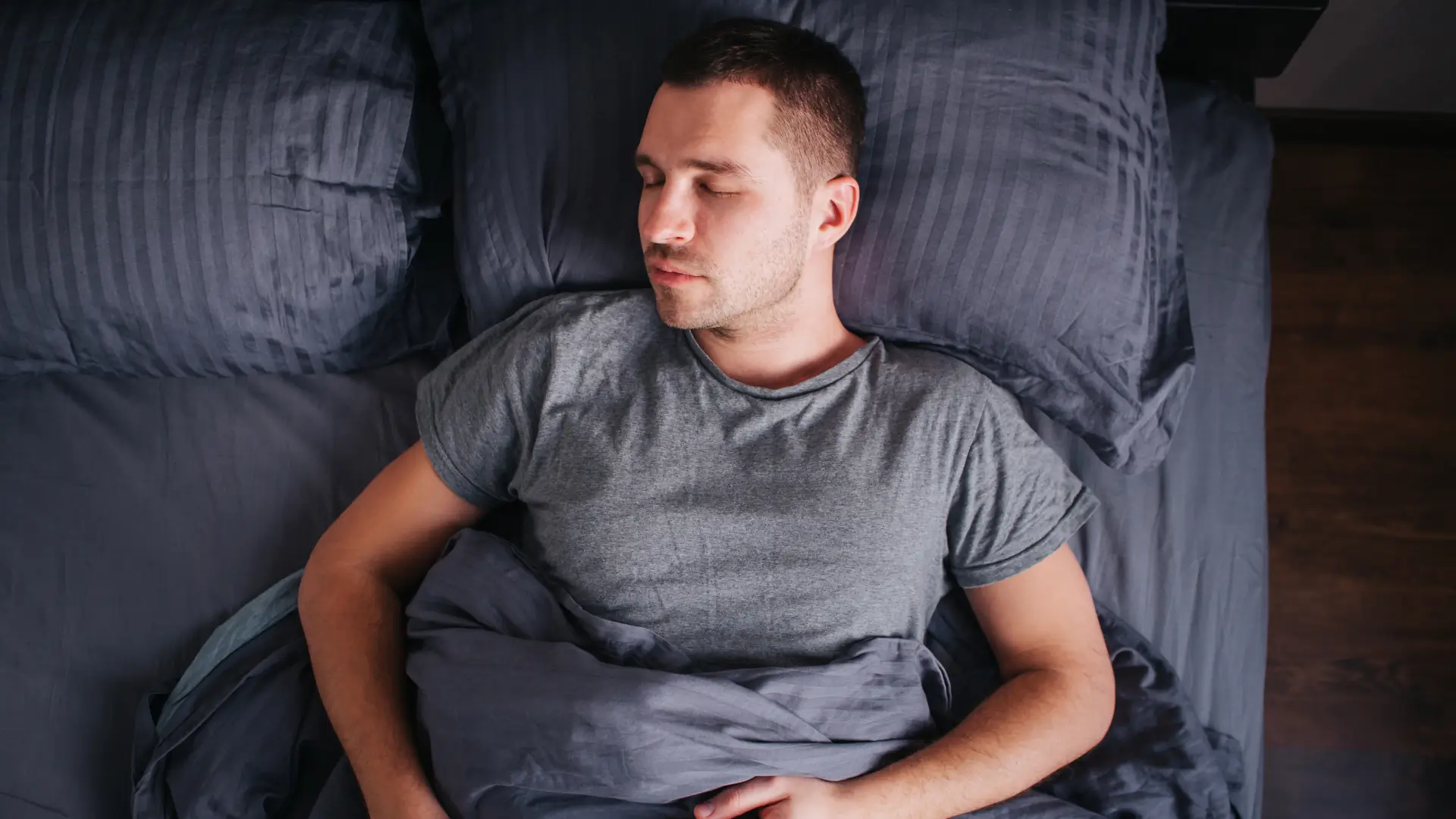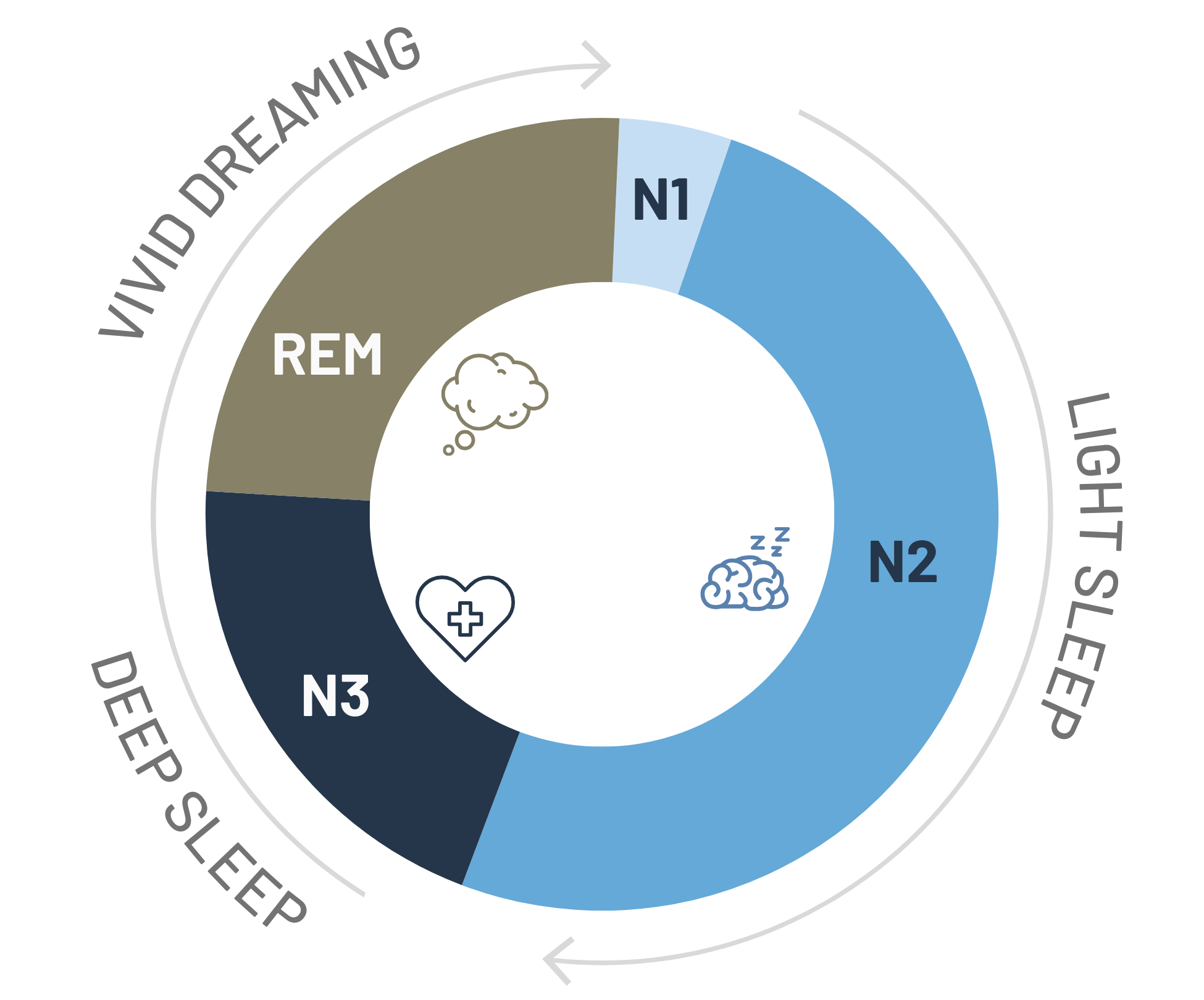
Sleep is a complex process that supports cognitive function, mental health, physical wellbeing and recovery. When you don’t get enough sleep, your health is negatively impacted and your risk of disease increases.
Learn more why sleep is important and how it works in our article. We also include several practical tips to improve your sleep and to help you sleep longer.
Key summary
- The two functions that control your sleep are sleep-wake homeostasis and circadian rhythm
- When you sleep, you cycle through 4 sleep stages including non-REM and REM sleep
- Sleep is extremely important for both physical and mental health in the long-term
- There are some key techniques to improve the quality of your sleep listed in our article
How sleep works
There are two processes that govern how and when you sleep. Sleep-wake homeostasis and your circadian rhythm are controlled by several parts of the brain, and involve a number of chemicals and hormones in the body (such as melatonin).
These functions are crucial to your sleep health, but they can be easily affected by your lifestyle and bedroom environment. Caffeine consumption, excessive napping and the use of devices before bed can be inhibitive to your body’s ability to wind down and fall asleep properly, among other examples. If you find it difficult to fall asleep, try our practical tips listed below.
Sleep-wake homeostasis
This term describes the need for sleep that builds during your waking hours. Simply put, the longer you are awake, the more you will want to sleep. Likewise, with sufficient sleep, your need for rest is reduced and you return to wakefulness. This homeostasis is a balance that works in tandem with your circadian rhythm.
Circadian rhythm
Your body responds naturally to changes in light, with a body clock that helps to manage your sleepiness depending on the time of day. Ideally, your body senses the morning light and brings about wakefulness, while the need for rest is triggered by the onset of nighttime.
This circadian rhythm is controlled by hormones and brain function, but can be influenced by external factors including diet, exercise, stress and daily routines, and especially light sources in the bedroom. Learn more about how to get better sleep.

Stages of sleep
Sleep is categorised in stages, split into a single REM (rapid eye movement) stage and several non-REM stages. You will cycle through these stages several times a night while you sleep, with the REM stage lasting longer and longer as the night progresses.
The first stage of sleep (N1) only lasts several minutes. As you fall asleep, your heart rate and breathing slow while your muscles begin to relax.
This experience deepens as your body enters the second stage. In N2, your temperature drops and your brain activity changes, producing sleep spindles. This stage is considered to be light sleep; it is easier to awaken at this point than in deeper phases of sleep, and it is during light sleep that you should aim to wake from a nap.
Deep sleep occurs in the third non-REM stage, N3. Known as slow-wave or delta sleep, this phase promotes growth and recovery. Your brain patterns exhibit delta waves while your body relaxes even more, undergoing tissue repair, cell regeneration and immune system management. Deep sleep is vital to restorative rest and overall health.
The final stage of sleep, REM sleep, is characterised by rapid eye movements and vivid or intense dreaming. Your limbs may experience some temporary paralysis while your brain activity spikes. REM sleep is thought to aid with memory and problem-solving.


The importance of sleep
Sleep is vitally important for your health and wellbeing. It is crucial for childhood development, with children requiring more sleep than adults as they grow. Most adults need 7-9 hours per night in order to have sufficient rest. Regardless of age, sleep supports the body and brain in several fundamental ways.
Regular and sufficient rest allows the brain to consolidate memories, process information and engage in problem-solving and decision-making. It supports cognitive function and mood, aids concentration and learning, and can improve some mental health conditions such as depression and anxiety. Sleep also promotes emotional regulation and improves your response to stress.
In addition, sleep strengthens your immune system, helping you to fight off infection and disease. It regulates hormones and supports metabolic health, playing a role in weight management. Sleep also influences your body’s ability to heal, triggering tissue repair and cell regeneration in deep sleep.
What are the negative effects of not getting enough sleep?
The effects of insufficient sleep may be felt immediately or they may be more long-term, impacting your life and general health.
For instance, according to Better Health, “staying awake for 24 hours leads to a reduced hand-to-eye coordination that is similar to having a blood alcohol content of 0.1.” Skipping even one night of rest can result in workplace injuries and accidents on the road.
Not getting enough sleep on a regular basis can cause:
- Weight gain
- Mood changes
- Lowered libido
- Impaired memory and concentration
- Poor balance and coordination
- High blood pressure and susceptibility to stress
- Weakened immunity and increased risk of illness
- Increased risk of diabetes and heart disease
If you are struggling with insomnia, we recommend reading our guest contribution by Dr Hailey Meaklim: Speaking on Insomnia.

Practical tips to sleep more & better
According to our 2024 Sleep Census, only 8% of people worldwide wake up feeling refreshed every morning. There are a number of ways you can promote the quality of your sleep. While they are not always achievable for every person and every lifestyle, some of these suggestions may help to regulate your circadian rhythm and prepare the body for sleep.
Practical tips include:
- Go to bed at the same time every night and wake up at the same time every morning
- Limit the time spent on devices before going to sleep
- Try to keep your bedroom dark, cool and quiet, free of clutter and distractions
- Maintain a healthy diet and exercise regularly; however, avoid exercising too close to your bedtime
- Avoid caffeine or large meals before bed
- Avoid napping in the late afternoon
For more tips, read our guide: 9 tips to get a better quality sleep
FAQs about sleep
How long does it take an average person to fall asleep?
It usually takes an average person 10-20 minutes to fall asleep. This timeframe will naturally vary and can be dependent on your sleep environment, overall comfort and your state of mind.
Is resting with eyes closed as good as sleep?
Resting with your eyes closed does not provide the same benefits as experiencing sleep. During deep sleep, your brain processes new information and stores memories while your body is able to recover, repairing tissue and strengthening your immune system, among other functions.
How damaging is lack of sleep?
A lack of sleep can cause significant health problems over time, from weight gain and lowered libido to high blood pressure and risk of heart disease. It can also affect your mental health and response to stress.
What are symptoms of lack of sleep?
If you are missing out on sleep, you may feel consistently fatigued, moody or irritable; you may be forgetful or clumsy; you may experience difficulty concentrating or focusing on tasks; and of course, you may find it difficult to maintain a regular sleep schedule.

